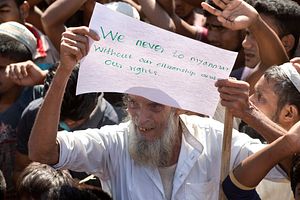Since the February 1 military coup in Myanmar, every element of the repatriation of Rohingya Muslim refugees living in Bangladesh back to Myanmar has been up in the air.
Days after the coup, junta chief General Min Aung Hlaing said in a television address that the junta would continue to repatriate the Rohingya refugees from Bangladesh.
Waves of Rohingya Muslims fled to Bangladesh especially after the 2017 military-led crackdown on Muslims in Rakhine State in western Myanmar.
However, there are few signs that refugees will be able return to a safe life in Rakhine.
In May, Bangladesh’s Prime Minister Sheikh Hasina told the visiting United Nations General Assembly President Volkan Bozkirn during his visit to Dhaka that safe and dignified repatriation of Rohingya seems uncertain amid the worsening situation in Myanmar.
Earlier on April 22, Bangladesh’s State Minister for Foreign Affairs Shahriar Alam said that the international community’s “business as usual” approach towards the coup in Myanmar was encouraging the Tatmadaw, as the Myanmar military is known, to continue committing atrocities on ethnic minorities.
Alam’s comment came close on the heels of a string of stern statements emanating from Dhaka that urged the international community to resolve the refugee crisis.
Foreign Minister A. K. Abdul Momen, for instance, had called on global leaders in March to abandon paying “lip service” to the refugee crisis and engage instead in creating a conducive environment for repatriation. “There are 1.1 million Rohingyas in the camps of Bangladesh and majority of them are girls and women,” Momen had pointed out, calling on world leaders to “come forward to repatriate them and reintegrate them in Rakhine and give them a future.”
With foreign companies continuing to do business with the Tatmadaw, the latter’s coffers – which they can use to wage war on the people of Myanmar – continue to overflow.
The link between international businesses and the Tatmadaw’s brutal offensives in Rakhine State, which forced over 750,000 Rohingya to flee to neighboring Bangladesh, was highlighted in a 2019 United Nations report. The report pointed out that 45 foreign companies operating in Myanmar had paid over $10 million to the Tatmadaw in the weeks following the crackdown in 2017. Millions of dollars channeled into military-owned business enterprises like the Myanmar Economic Holdings Limited and Myanmar Economic Corporation did not flow into the economy but was parked with the military, strengthening the military’s “autonomy from elected civilian oversight” and facilitating its offensives against the Rohingya, the report said.
Such business links with Tatmadaw-controlled enterprises remain strong since the February coup.
Emerging Towns and Cities Singapore Ltd (ETC), a Singapore-based developer that is the lead investor in the Golden City project in Yangon, is reported to be channeling millions of dollars to the military department tasked to buy weapons that the Tatmadaw uses against the ethnic minorities.
With the Tatmadaw continuing to receive millions of dollars from foreign companies, the violence in Rakhine that is forcing Rohingya to flee to Bangladesh will not stop.
Meanwhile, conditions in Myanmar are not conducive for the return of refugees.
In cities like Yangon and Naypyidaw, Myanmar’s Bamar ethnic majority is indifferent to the repatriation issue. According to a Myanmar-based security analyst, who spoke to The Diplomat on condition of anonymity, the Rohingya issue is the last thing on the minds of the Bamar majority now. “Most people understood the cruelty and ruthlessness of the military operations in Rakhine and are sympathetic to the suffering of the Rohingya, but were angered by Rohingya activists blaming National League for Democracy leader Aung San Suu Kyi and the rest of Myanmar instead of just the Tatmadaw for the attacks against them,” the analyst said.
Since the coup, ethnic solidarity has grown. There are signs that people are becoming more accepting of the Rohingya, but only if they openly stand with the rest of the groups fighting the coup leaders, the security analyst said.
On the other hand, most refugees living in Bangladesh’s Cox’s Bazar camps do not want to return to Myanmar. A 2019 UNHCR survey found that almost all the 214 families interviewed did not want to return until their key demands are met.
Rohingya want to return to Myanmar with citizenship rights and a guarantee of safety. Most refugees believe Rakhine is still hostile and unsafe for them.
Saqib Sheikh, a program director at the Rohingya Project in Cox’s Bazar, said that the situation on the ground is unsafe and that the conditions for repatriation that Myanmar agreed to meet in 2018 will likely not be achieved soon.
For the Tatmadaw, however, repatriating Rohingya could be a useful tactic to win international legitimacy. It has been discrediting the opposition NLD to project itself as the guardian of Burmese nationalism and to promote corporate unity within its ranks. Stepping up repatriation is seen as likely to help the generals spruce up their image and credibility in the eyes of the international community.
However, any repatriation that is initiated when Bamars remain indifferent to the plight of the Rohingya slims down chances of their dignified return to Rakhine, one where the Rohingya are recognized with citizenship and ownership of their ancestral land.
Intentional or not, ASEAN’s invitation to the military junta for a dialogue on April 24 signaled that the regional grouping wants to do business with the junta.
While the June 18 U.N. resolution on Myanmar called for restoring democracy and recognizing ASEAN’s central role, it remained mum on repatriation and addressing the root causes of the refugee crisis.
It is evident that global actors will only offer lip service to the 750,000 Rohingya stranded in Bangladesh, while it will be business as usual with Myanmar.

































